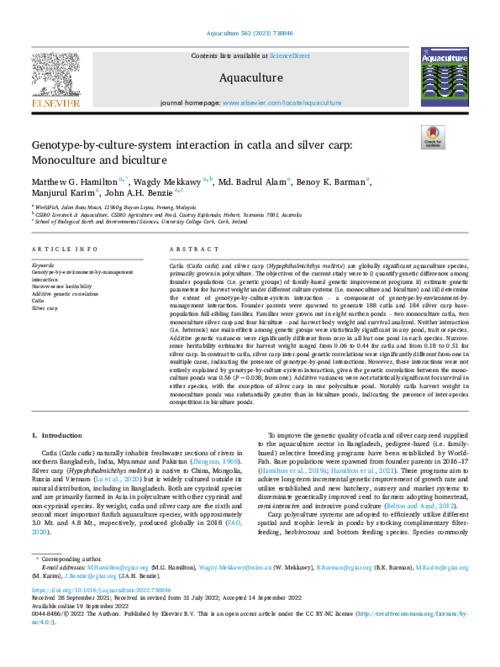Genotype-by-culture-system interaction in catla and silver carp: Monoculture and biculture
Abstract
Catla (Catla catla) and silver carp (Hypophthalmichthys molitrix) are globally significant aquaculture species, primarily grown in polyculture. The objectives of the current study were to i) quantify genetic differences among founder populations (i.e. genetic groups) of family-based genetic improvement programs ii) estimate genetic parameters for harvest weight under different culture systems (i.e. monoculture and biculture) and iii) determine the extent of genotype-by-culture-system interaction – a component of genotype-by-environment-by-management interaction. Founder parents were spawned to generate 188 catla and 184 silver carp base-population full-sibling families. Families were grown out in eight earthen ponds – two monoculture catla, two monoculture silver carp and four biculture – and harvest body weight and survival analysed. Neither interaction (i.e. heterosis) nor main effects among genetic groups were statistically significant in any pond, trait or species. Additive genetic variances were significantly different from zero in all but one pond in each species. Narrow-sense heritability estimates for harvest weight ranged from 0.06 to 0.44 for catla and from 0.18 to 0.51 for silver carp. In contrast to catla, silver carp inter-pond genetic correlations were significantly different from one in multiple cases, indicating the presence of genotype-by-pond interactions. However, these interactions were not entirely explained by genotype-by-culture-system interaction, given the genetic correlation between the monoculture ponds was 0.56 (P = 0.038; from one). Additive variances were not statistically significant for survival in either species, with the exception of silver carp in one polyculture pond. Notably catla harvest weight in monoculture ponds was substantially greater than in biculture ponds, indicating the presence of inter-species competition in biculture ponds

